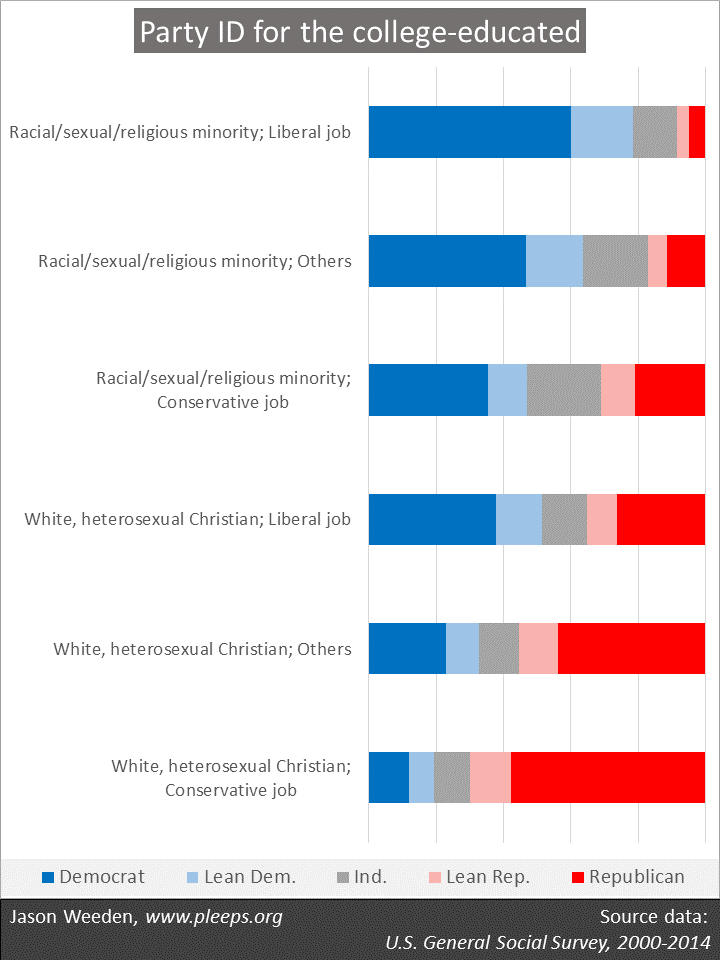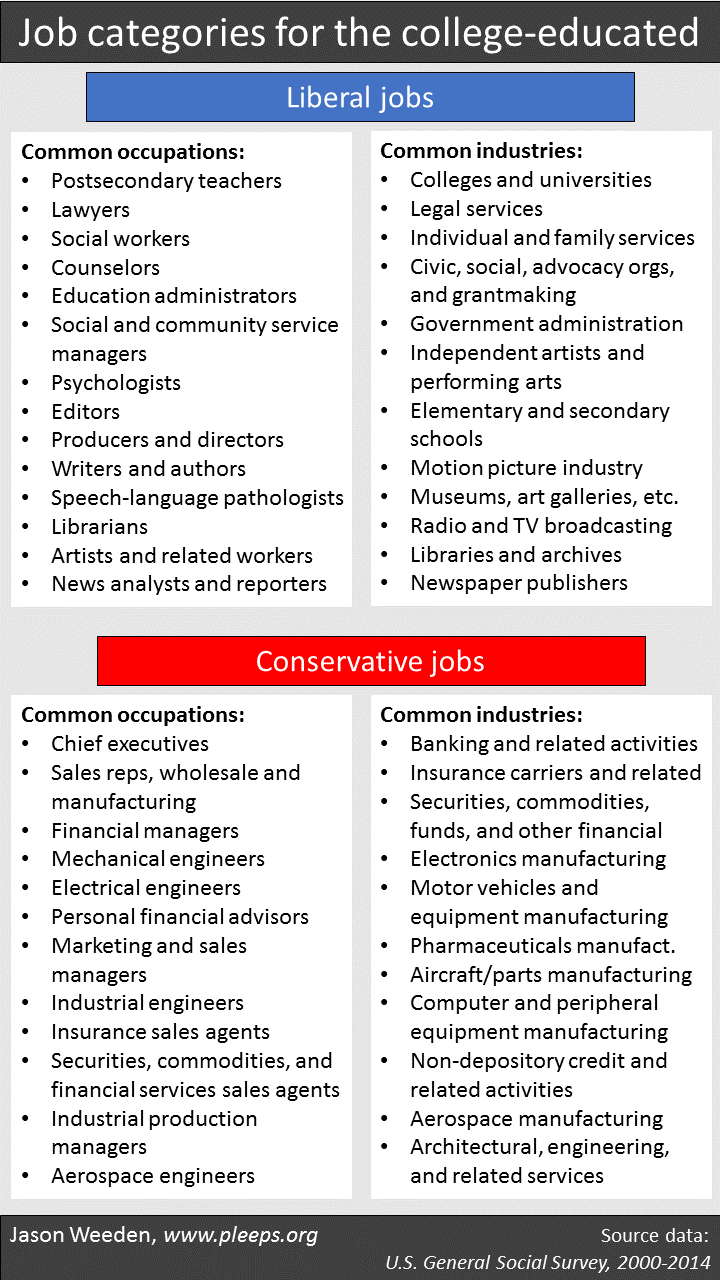What does someone’s work life suggest about their politics? I’ve been spending time with the U.S. General Social Survey’s revised industry and occupation codes to try to get a clearer picture. I previously showed my initial analysis of the entire GSS sample. Today I want to focus on college graduates, where some of the most potent political contrasts appear.
After poking around, I’m settling into a pretty good sense of where the Democratic-leaning vs. Republican-leaning industries and occupations are. For college graduates, Democrats are especially likely to be found in jobs and fields relating to social work, among lawyers and those with writing/editing jobs, and at universities, non-profits, and artistic enterprises. Republicans are especially likely to be found among CEOs, engineers, and people with financial jobs, and in industries relating to manufacturing, wholesale, and extraction.
I combined all these job-related factors and created three clumps for the college-educated sample: Liberal jobs (17% of the sample), conservative jobs (18%), and others (65%). The chart below shows examples of some of the most common occupation and industry classifications in the liberal and conservative categories. The rest of the sample (the “others” in the middle) are commonly K-12 teachers, nurses, doctors, accountants, tech workers, retail workers, and so on, working in industries such as schools, hospitals, construction, tech, real estate, restaurants, and so on.
How Democratic are folks in liberal jobs and how Republican are folks in conservative jobs? In the chart below, I show the college-educated sample broken down by job category and also by the even-more-important split between white, heterosexual Christians and everyone else (i.e., people who are non-white or lesbian/gay/bisexual or non-Christians). Overall, these kinds of racial/sexual/religious splits are the biggest factors driving party identification.
So how big of a deal are the job categories? Pretty big. In short, when it comes to the basic partisan orientations of the college-educated, people who are white, heterosexual Christians in liberal jobs are hardly distinguishable from racial/sexual/religious minorities in conservative jobs. The super-Democrats are minorities in liberal jobs (almost 80% land or lean Democratic) while the super-Republicans are white, heterosexual Christians in conservative jobs (over 70% land or lean Republican).
 (Note: The sample size is 5,643.)
(Note: The sample size is 5,643.)
The job categories have some basic demographic skews loaded in. There aren’t big racial differences between those in liberal and conservative jobs, but there are larger differences in education, gender, income, and religion. Those in liberal jobs are more likely to have postgraduate degrees, be women, have lower incomes, and be non-Christians. And vice versa for the conservative jobs—fewer postgrad degrees, more men, more income, and more Christians. Even so, these job categories provide clues to party identification that go substantially beyond the usual demographics.
Of course, to notice a correlation of this kind is not to settle how causality works. Maybe these jobs attract people who already leaned in one partisan direction or the other; or perhaps the different fields encourage different partisan leanings; or, most likely, perhaps both processes occur to different degrees with different people. Nonetheless, when we talk of partisanship reflecting “identities,” it’s clear that these identities include not just who we are but also what we do.
The analysis in this post covers only those with 4-year college degrees. For people with less education, occupation and industry categories are less strongly related to partisanship. While police and military jobs are especially potent signals of increased Republican leaning among the non-degreed, I don’t see many other substantial and coherent themes. (That is to say, themes beyond the usual demographics—for example, less-educated folks do show solid connections between partisanship and race, income, and union membership. It’s just that, beyond these kinds of ordinary demographics, and beyond the point about police and military, there isn’t a whole lot there that seems important in their job info.)
Depends on what you mean by “elites”
At the beginning of chapter 6 of our book, Kurzban and I discuss how both parties like to complain about “elites”—the difference being that Republican complaints are mostly about educational and cultural elites while Democratic complaints are mostly about financial elites. We used the examples of Republican reaction to Obama’s “bitter” gaffe and Democratic reaction to Romney’s “47 percent” gaffe. Our discussion pointed out general demographic patterns where high-education folks are often Democrats while high-income folks are often Republicans.
The data on occupations and industries reinforces this point. Sure enough, even taking into account standard demographics, Democrats really are found disproportionately among college professors, writers, artists, Hollywood, and the news media. And, sure enough, even taking standard demographics into account, Republicans really are found disproportionately in executive suits and financial jobs. The two parties actually do represent (among other things) a major split between educational/cultural elites and financial elites.
But what makes liberal jobs liberal and conservative jobs conservative? I would be very skeptical of easy answers. There’s probably something going on relating to the fact that many liberal jobs are centrally supported by tax dollars while many conservative jobs benefit particularly from low capital gains tax rates. There’s probably something going on relating to the fact that many liberal jobs involve trading away money in favor of doing things that are “cool” while many conservative jobs are totally just frickin’ jobs. There’s probably something going on relating to basic personality differences that would drive some people to spend all day helping the disadvantaged while driving others to focus almost entirely on personal financial gain.
But all these kinds of explanations, to the extent they work at all, apply only in limited ways. For now, I’m happy to have a better sense of how jobs relate to party identification, even if I’m not sure why.

